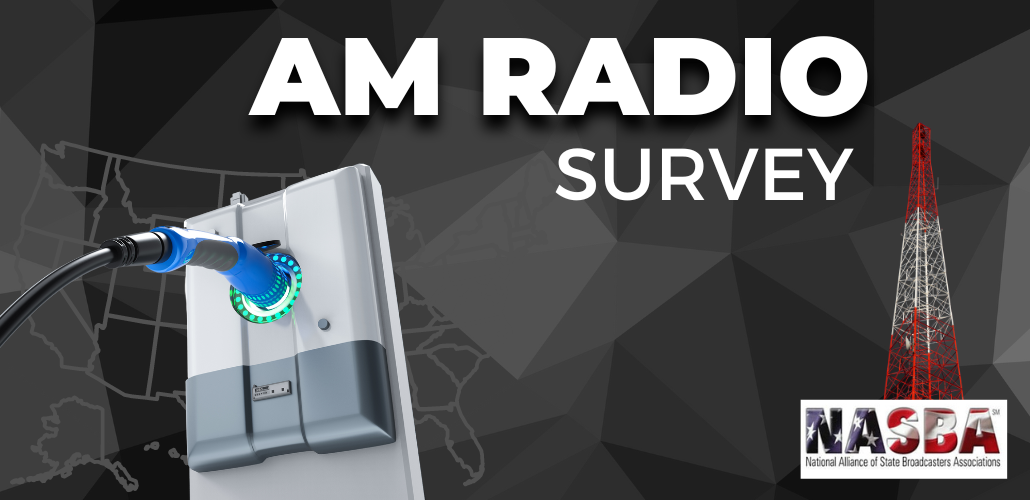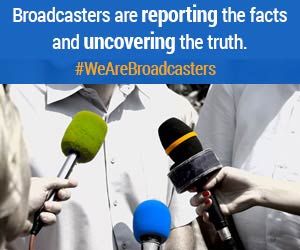AM RADIO LISTENERS ENJOY RICH MIX OF MUSIC AND NEWS ON THOUSANDS OF BROADCAST STATIONS ACROSS AMERICA
State Association Survey Finds One in Three AM Stations Have No FM Sister Signal
Only Half Are Streaming Signals Via Online Platforms
As automakers cut corners on expensive new electric vehicles, trimming out AM radio reception in some models, AM radio listeners to more than 4,000 stations risk losing access to breaking news, weather alerts, farm reports, favorite music, and informative talk programs. Even with “AM modernization” efforts that have added FM “translators” for many AM stations, many stations do not have an FM counterpart and do not stream their community-focused signals over Internet connections.
The findings are from an April survey fielded by the National Alliance of State Broadcasters Associations (NASBA) with participation from more than 1,000 AM radio stations from all 50 states and Puerto Rico. The survey was conducted in response to the growing trend of automakers removing AM reception from some electric vehicles (EVs) and potentially, like in the case of Ford Motor Co., from traditional internal combustion engine vehicles.
“The findings show what we expected – AM radio across America is a diverse mix of music and talk and a vital link for millions of listeners. The goal of our station survey was three-fold. First, we wanted to confirm AM radio’s diverse landscape of formats, languages, and ownership. Second, we wanted to quantify AM radio’s crucial part in the nation’s Emergency Alert System. And third, we wanted feedback that will guide our state association response going forward,” said Dewey Bruce, President of the National Alliance of State Broadcasters Associations and the Montana Broadcasters Association.
“While the common perception is that only talk radio thrives on AM, the survey found that 40% of respondents air music formats ranging from classic country and oldies to Spanish Regional Mexican and inspirational gospel,” Bruce added.
In responding to a request from Massachusetts Senator Ed Markey to inform his office of their current and future plans in AM, several automakers stated that even with the removal of AM radio, drivers would be able to access stations through streaming audio or on the FM dial (through the use of translators and/or FM simulcasting). Those statements are only partially true. While upwards of 70% of responding stations can be found on FM translators, hundreds of stations are without a home on FM. Extrapolating that percentage to the 4,475 licensed AM stations in the United States means that 1,300 AM stations could be left in the dark.
99% of respondents indicated they participate in the Emergency Alert System (EAS). According to the Federal Emergency Management Agency (FEMA) “Primary Entry Point” (PEP) stations, which are designated distribution stations for EAS messages and are mostly on the AM dial can reach 90% of the U.S. population in the event of an emergency. That coverage is significantly reduced if AM can no longer be found in automobiles.
Of the roughly 725 stations that indicated they did have an FM translator, less than 20% have an FM signal coverage area that is equal to or greater than its AM counterpart. Removing AM radio from automobiles would result in giant swaths of the United States at risk of not receiving critical emergency communications from federal, state, or local governments.
Additionally, the survey found that more than half of AM stations do not currently have a standalone mobile app and 40% are not currently found on radio aggregators. For many AM operators working diligently to keep their over-the-air signal on the air, providing the local news, music, entertainment, and emergency information that their communities rely upon, the expense of streaming their station and paying additional royalties is simply not realistic.
The most telling survey result is that 8 in 10 respondents listed their level of concern a 10 out of 10 when it comes to AM being eliminated in the car. NASBA and its Automotive Dashboard subcommittee, in coordination with our individual state associations, boards of directors, member stations, our partners at the National Association of Broadcasters, and proponents of AM radio around the country continue to work towards preserving AM radio.




